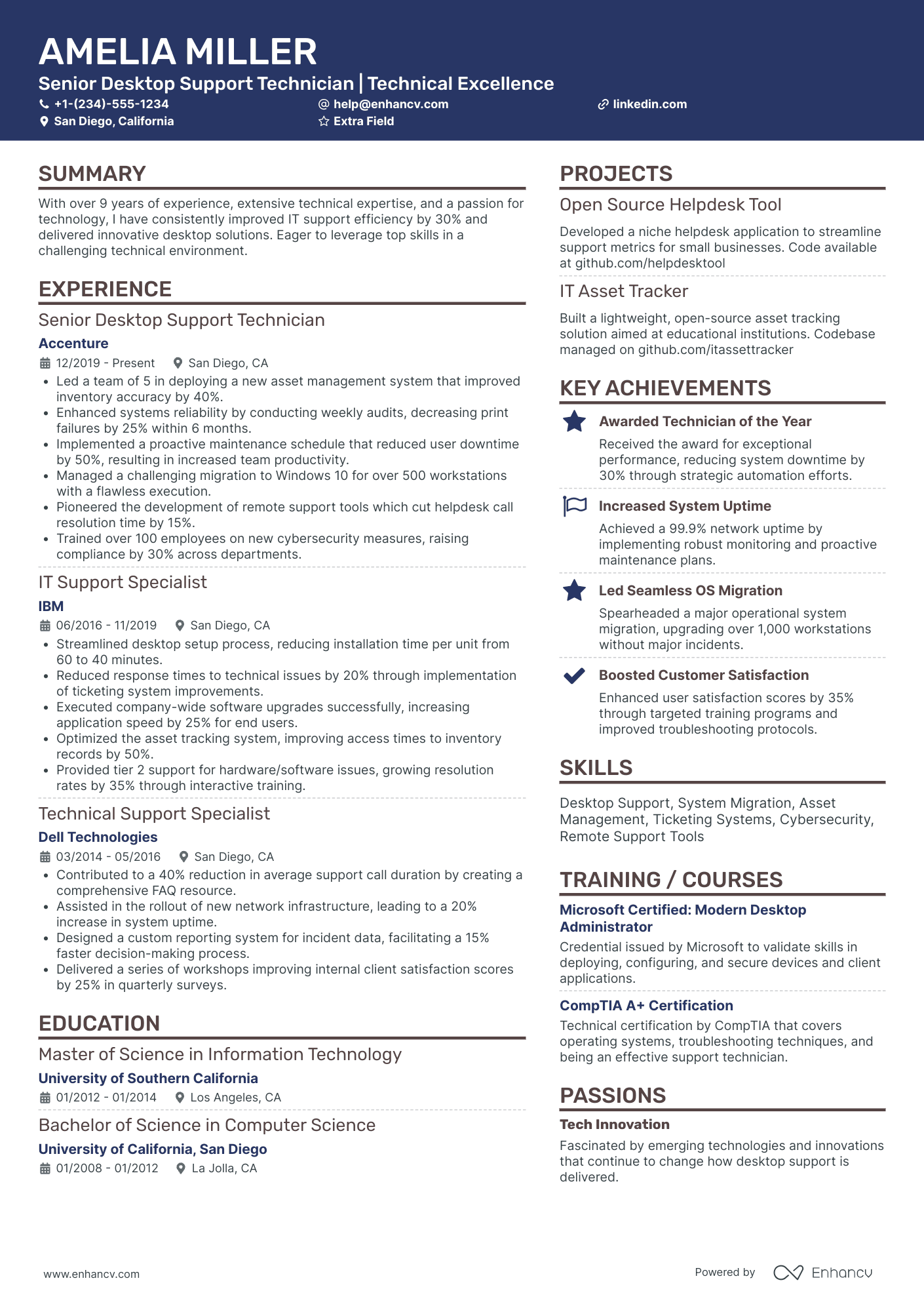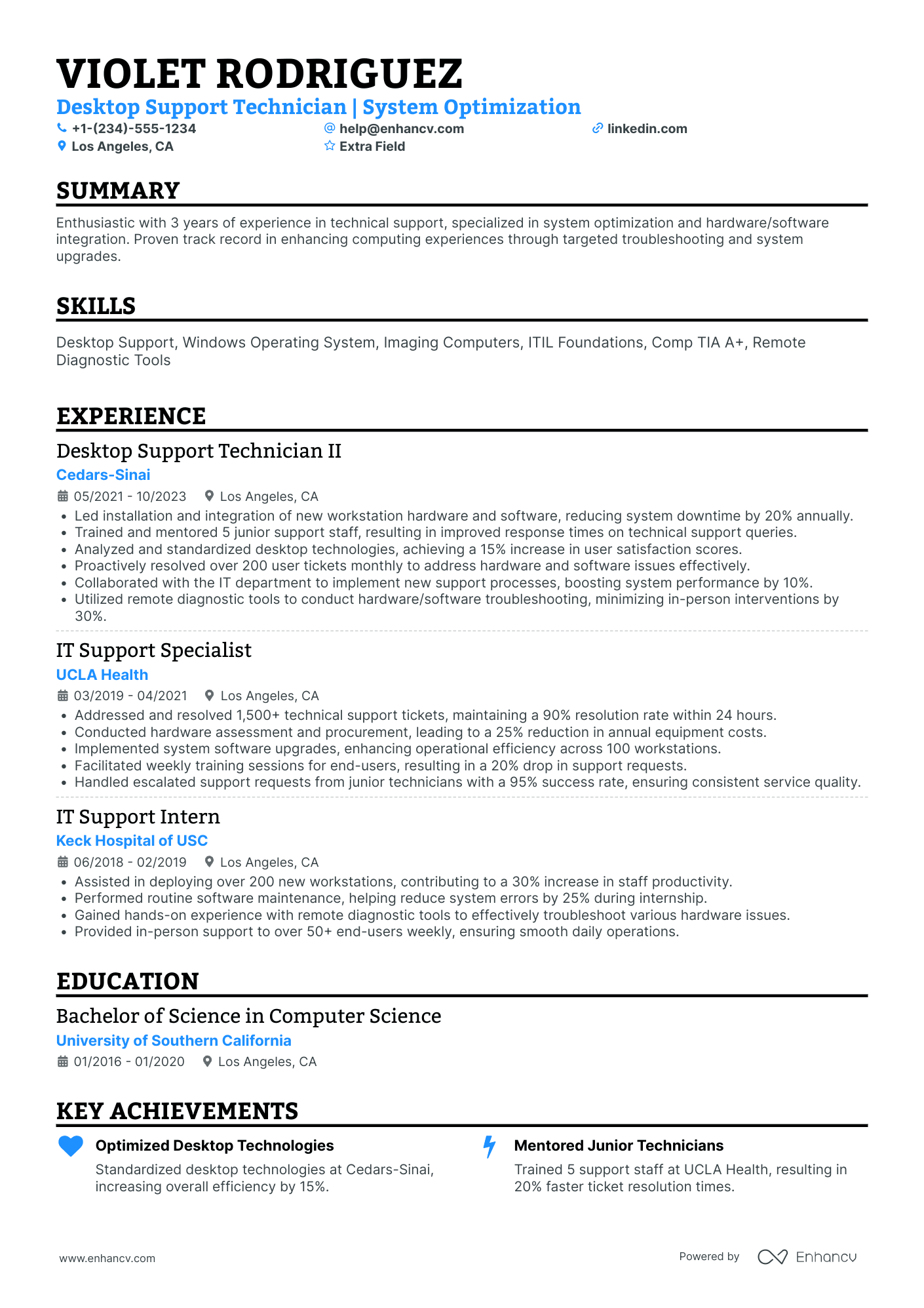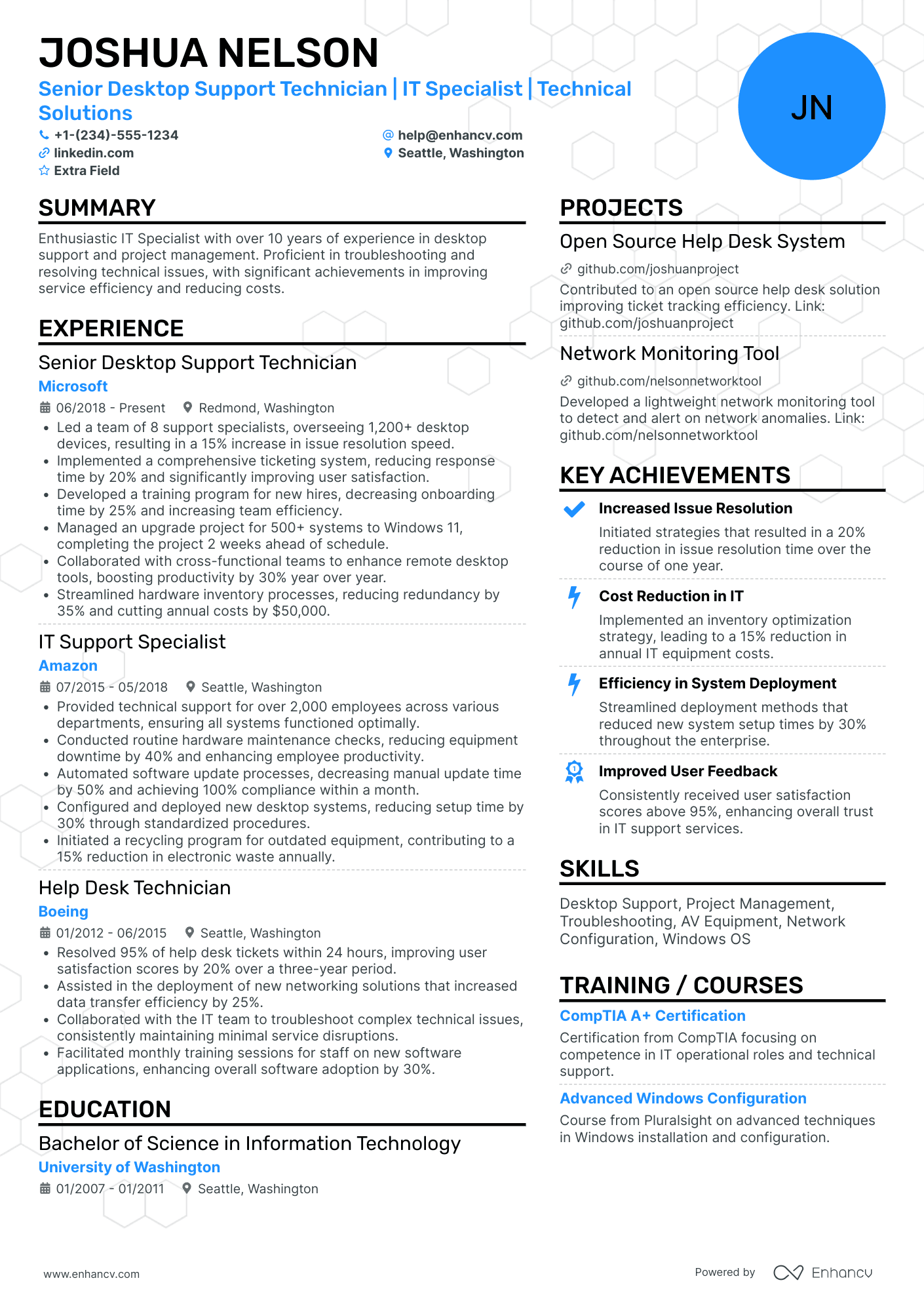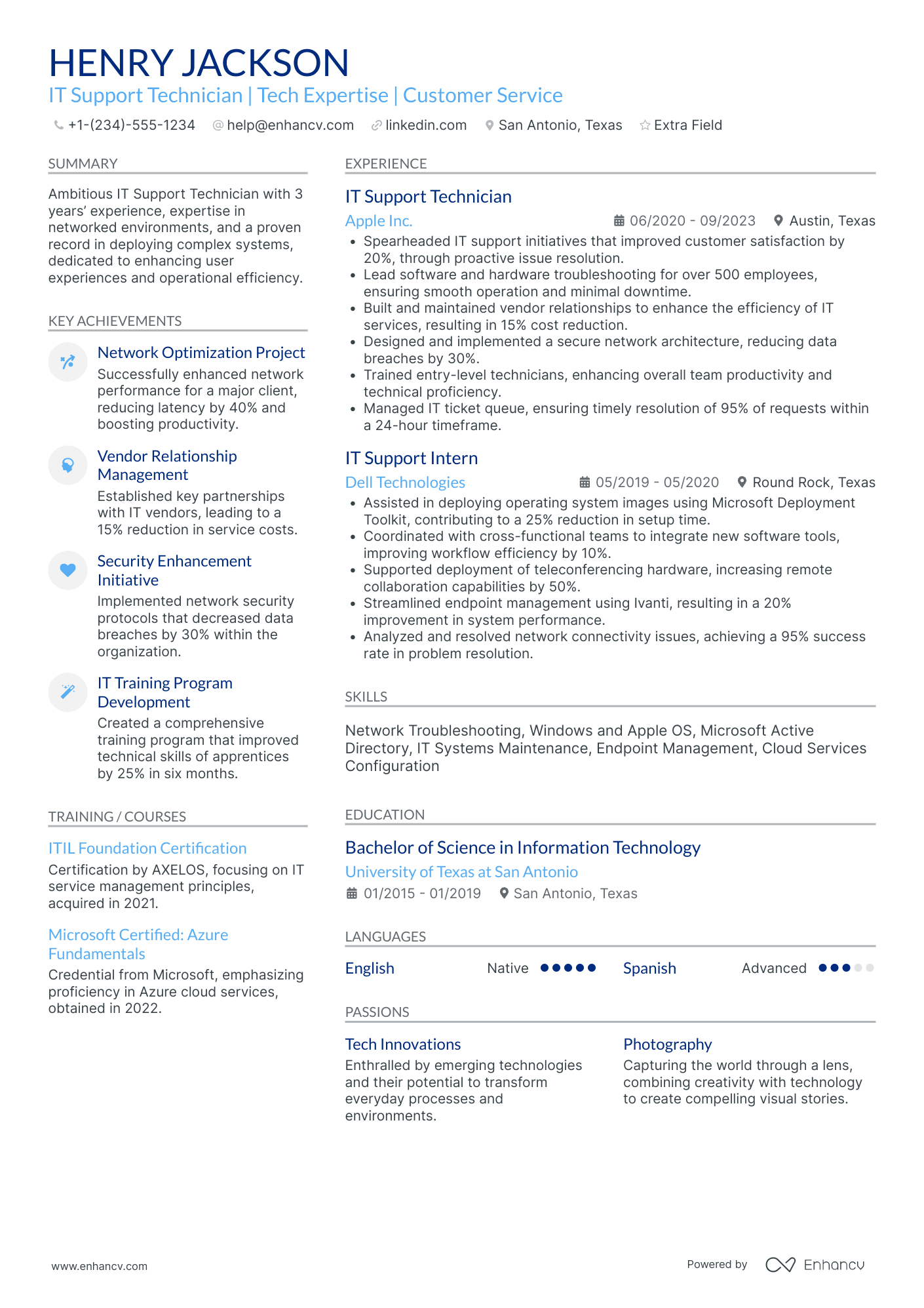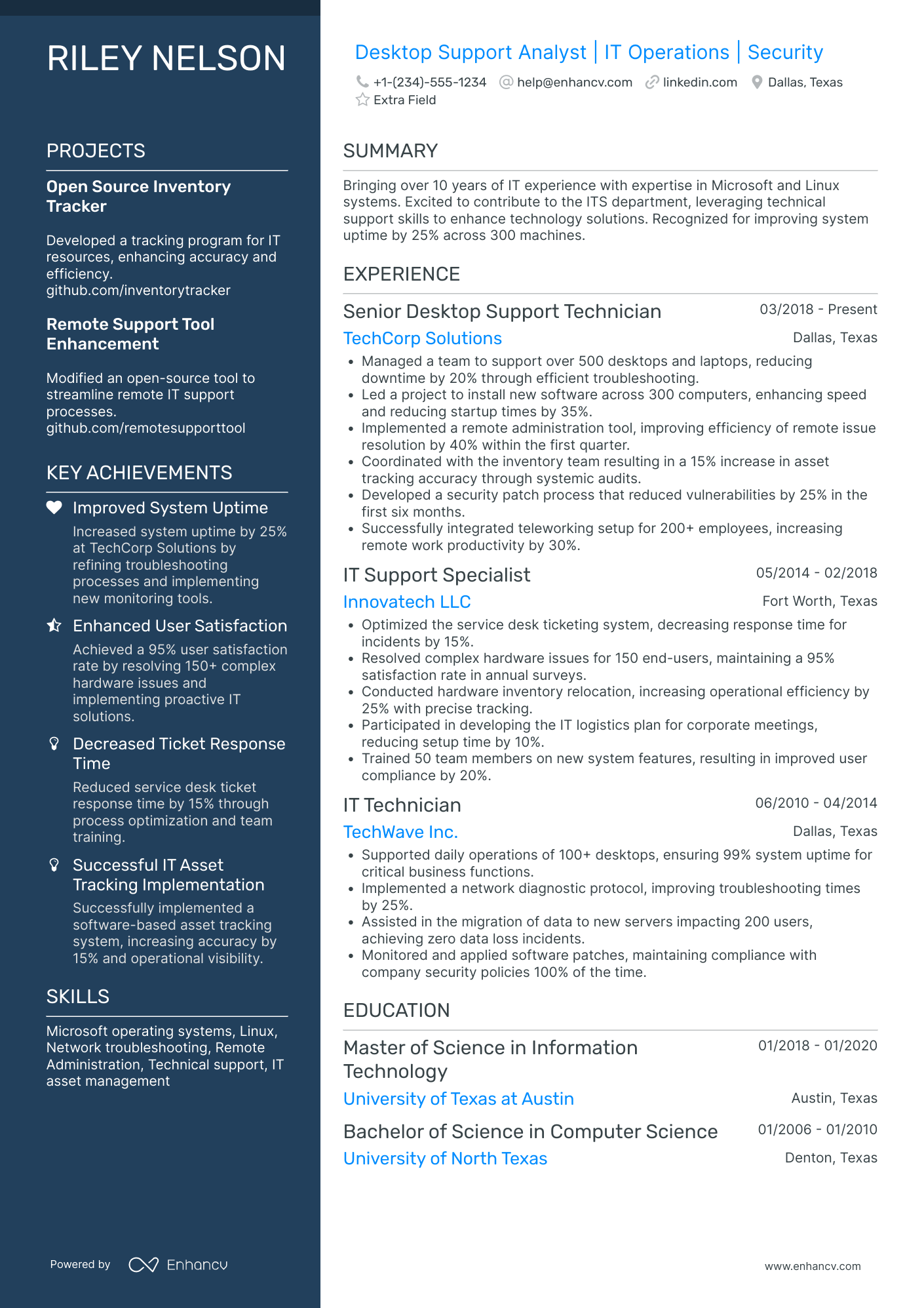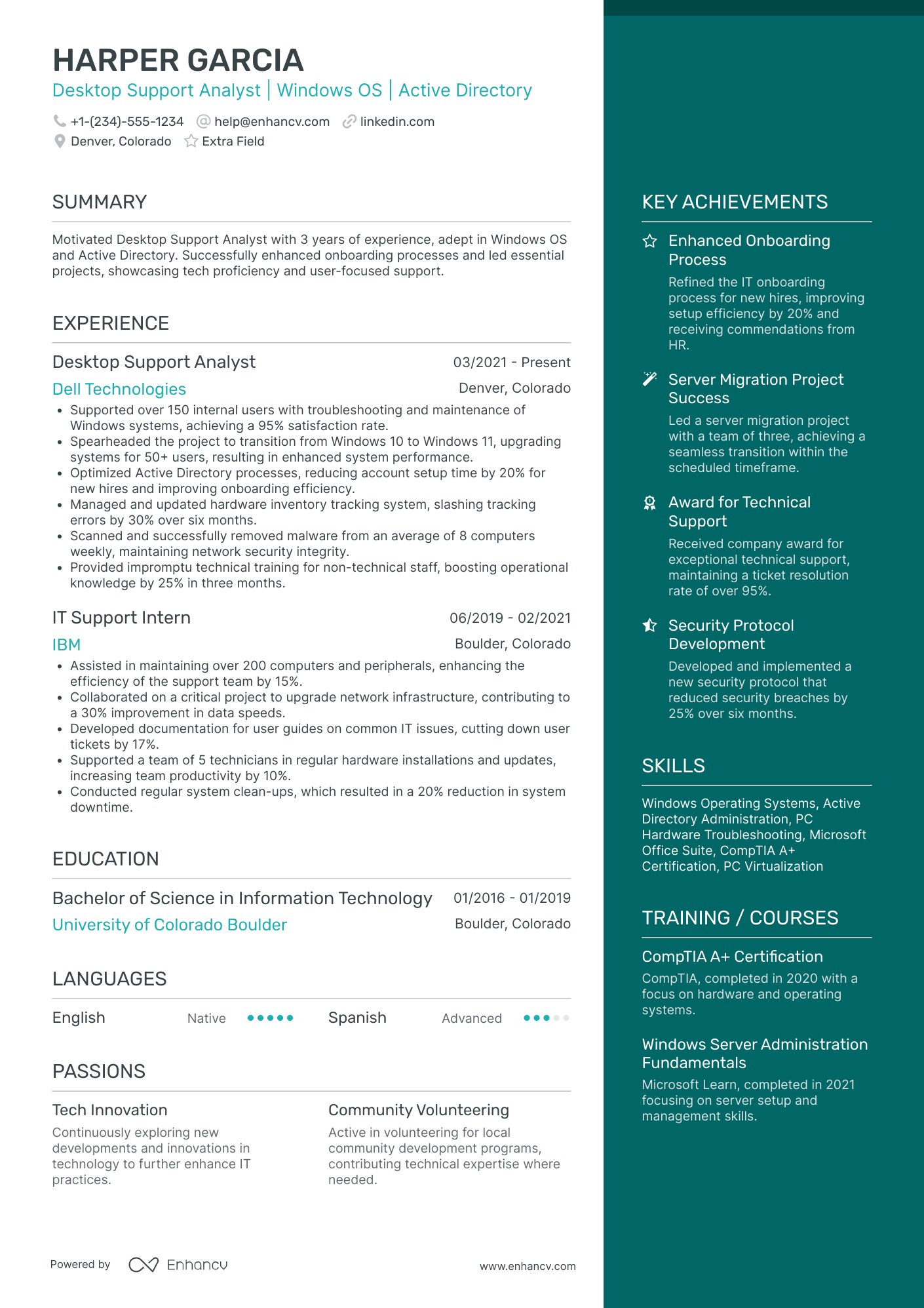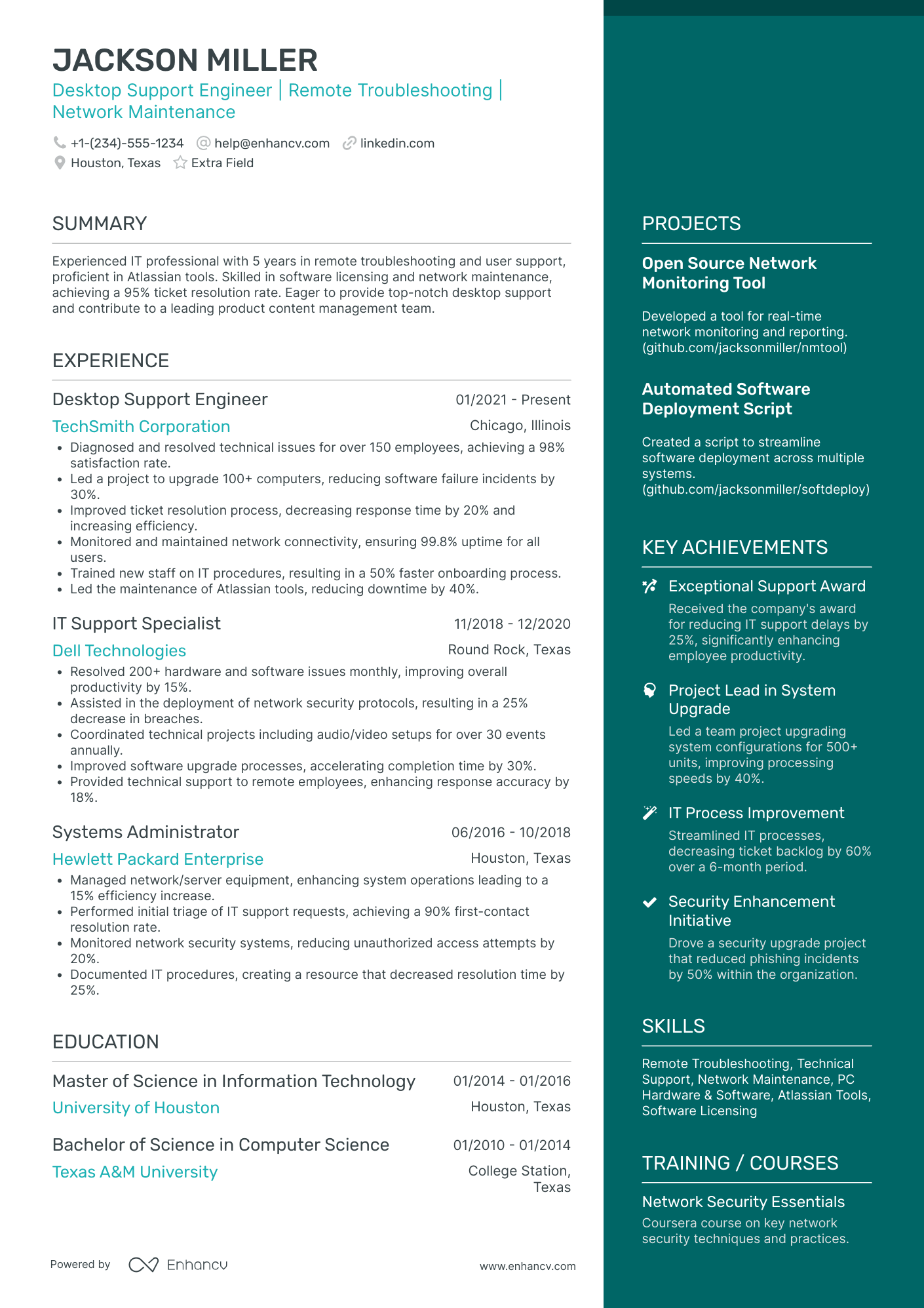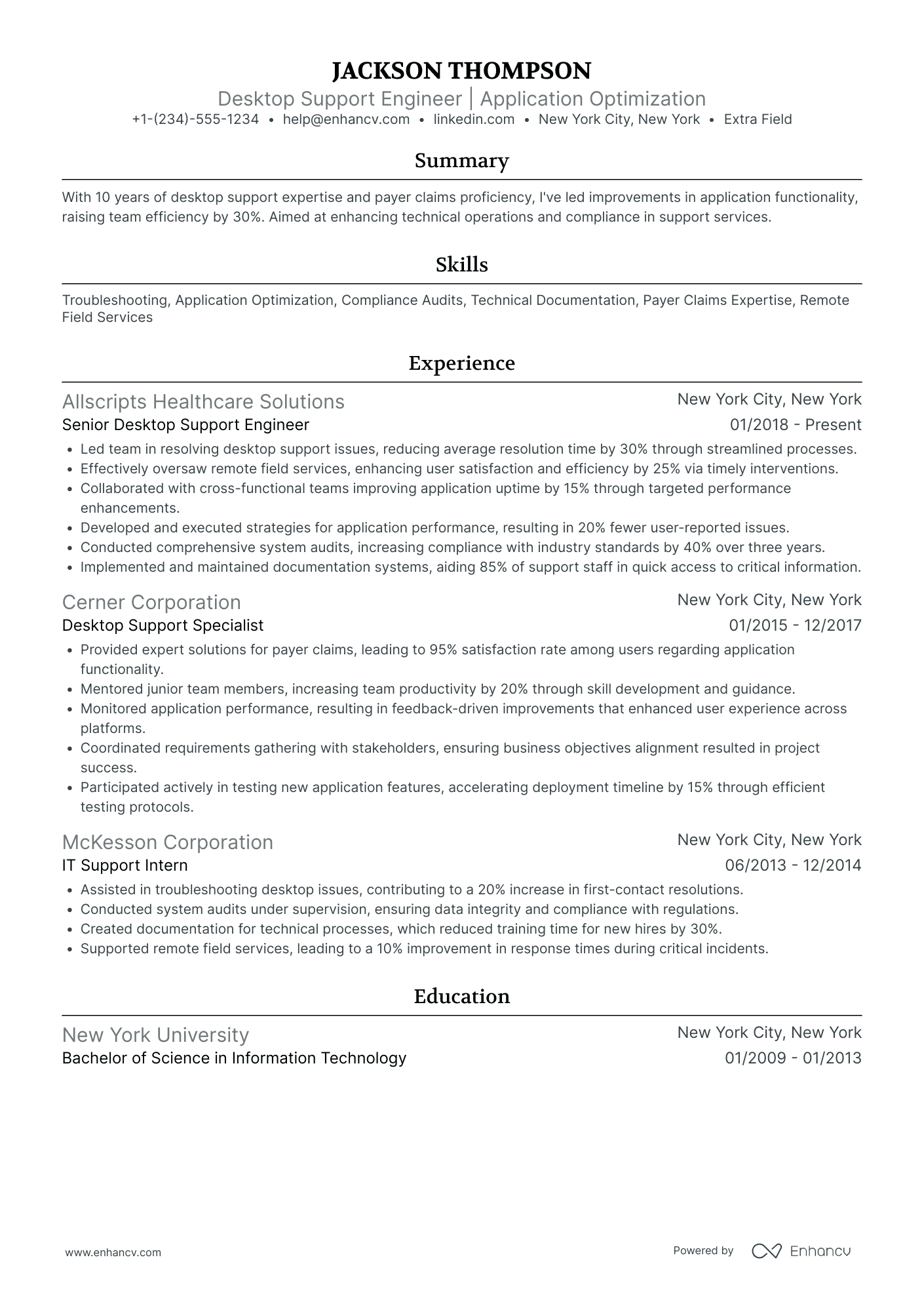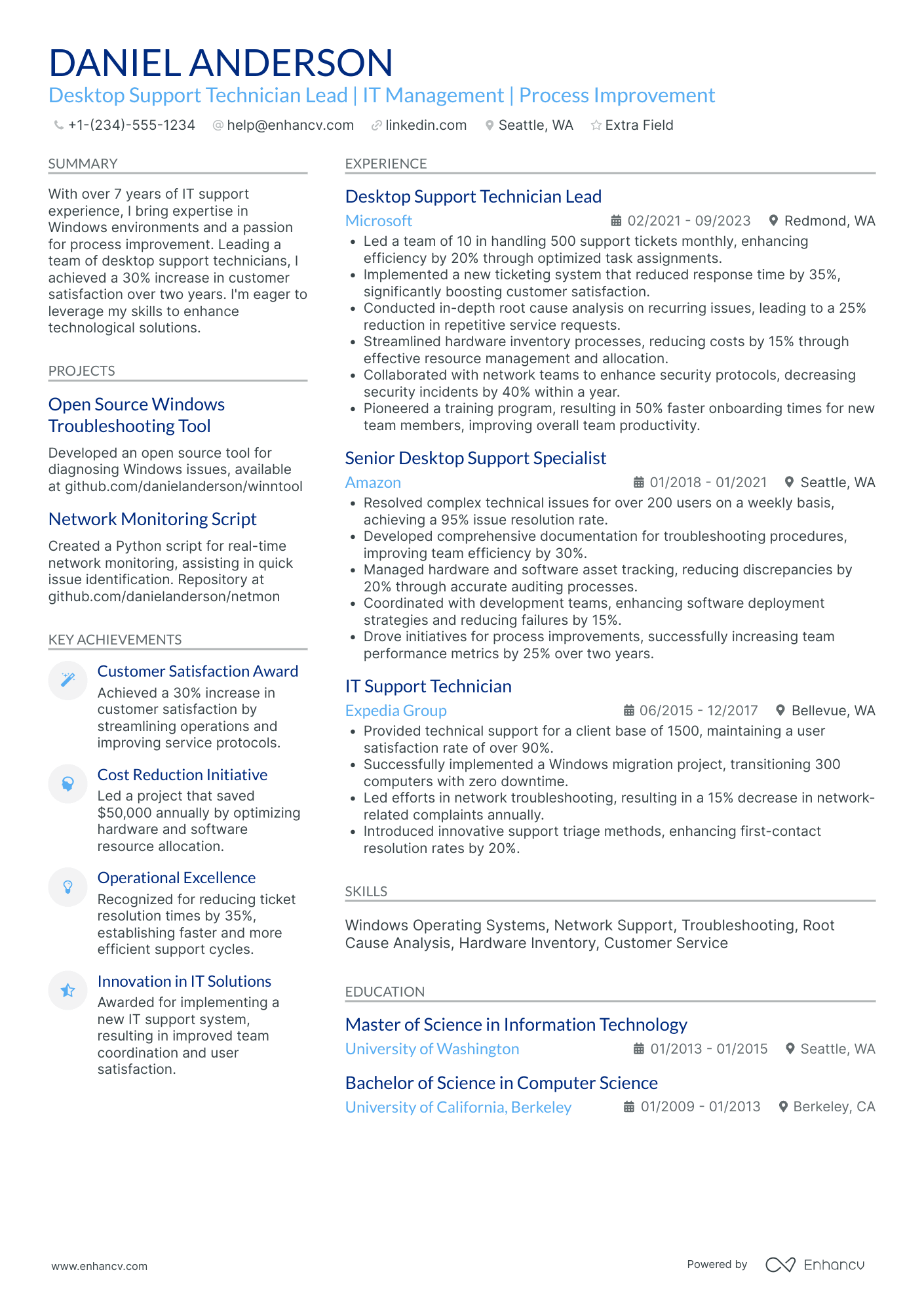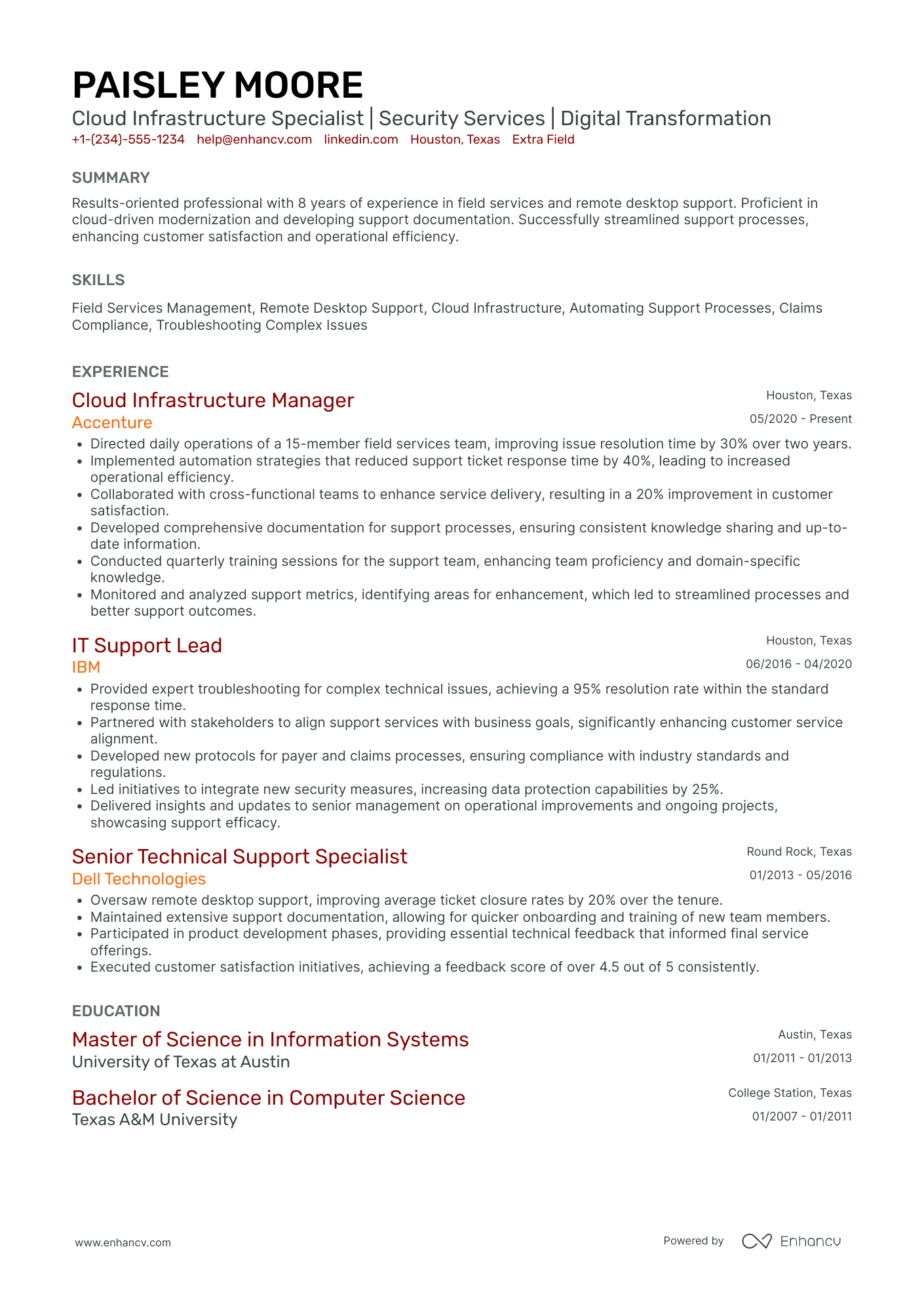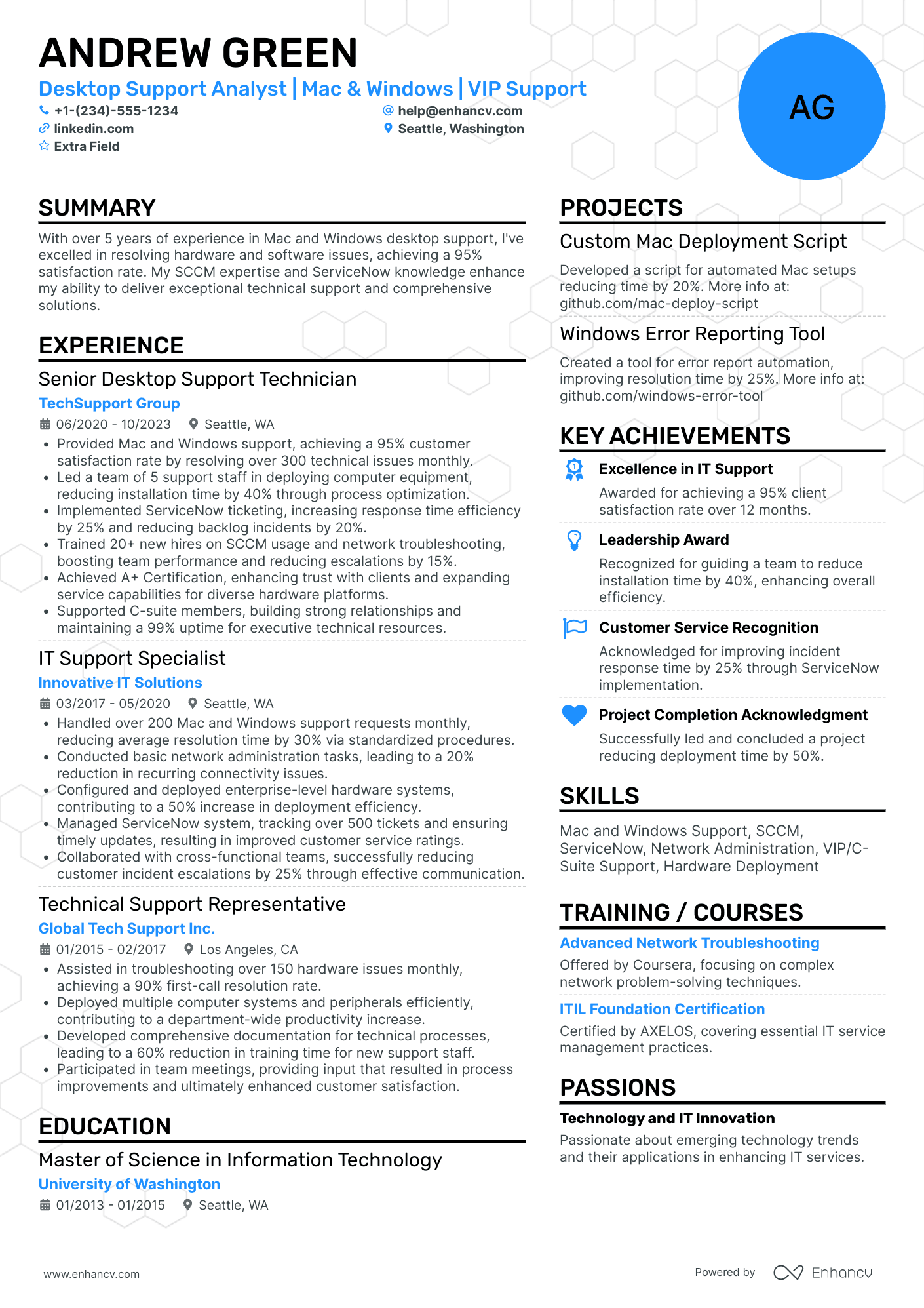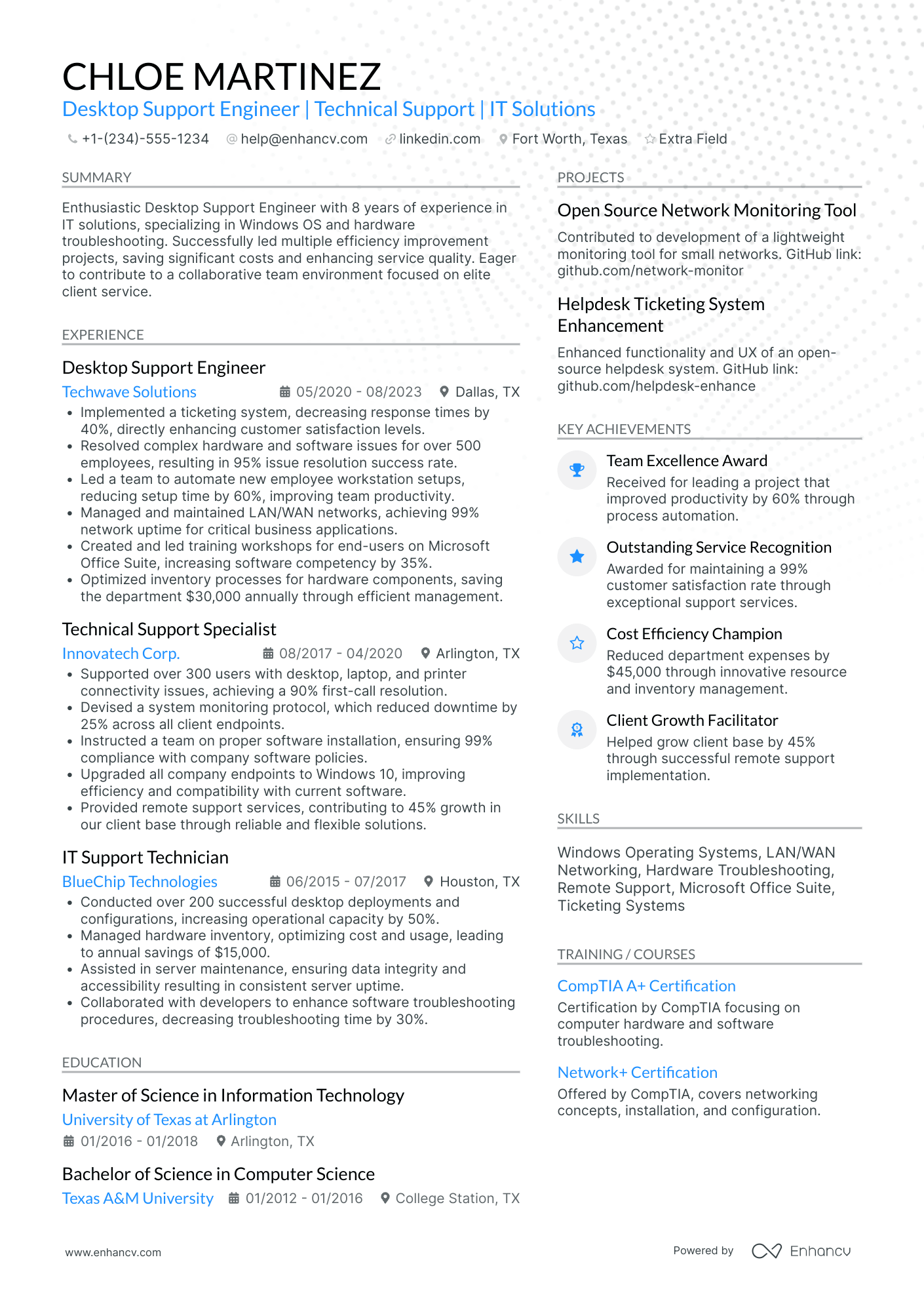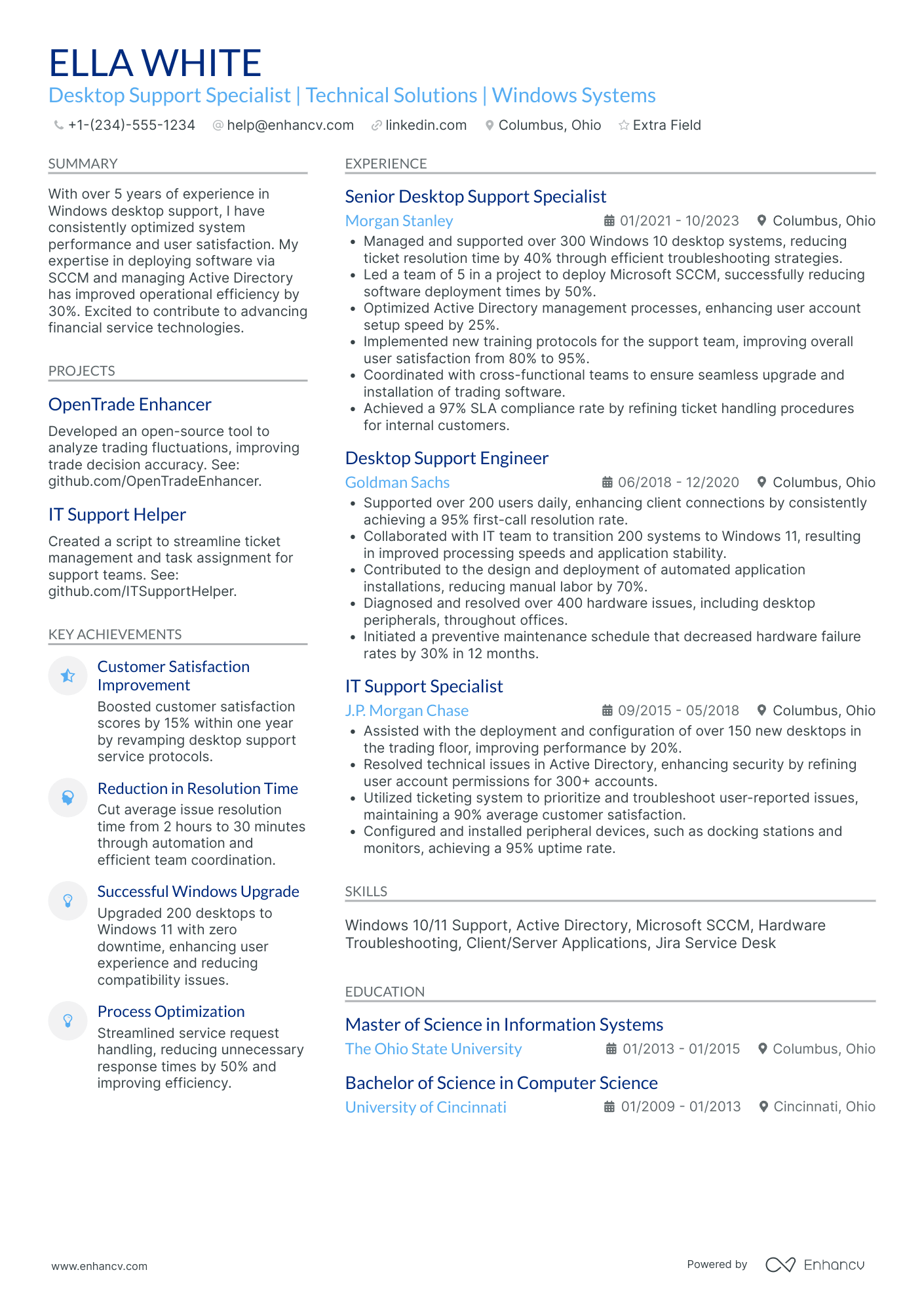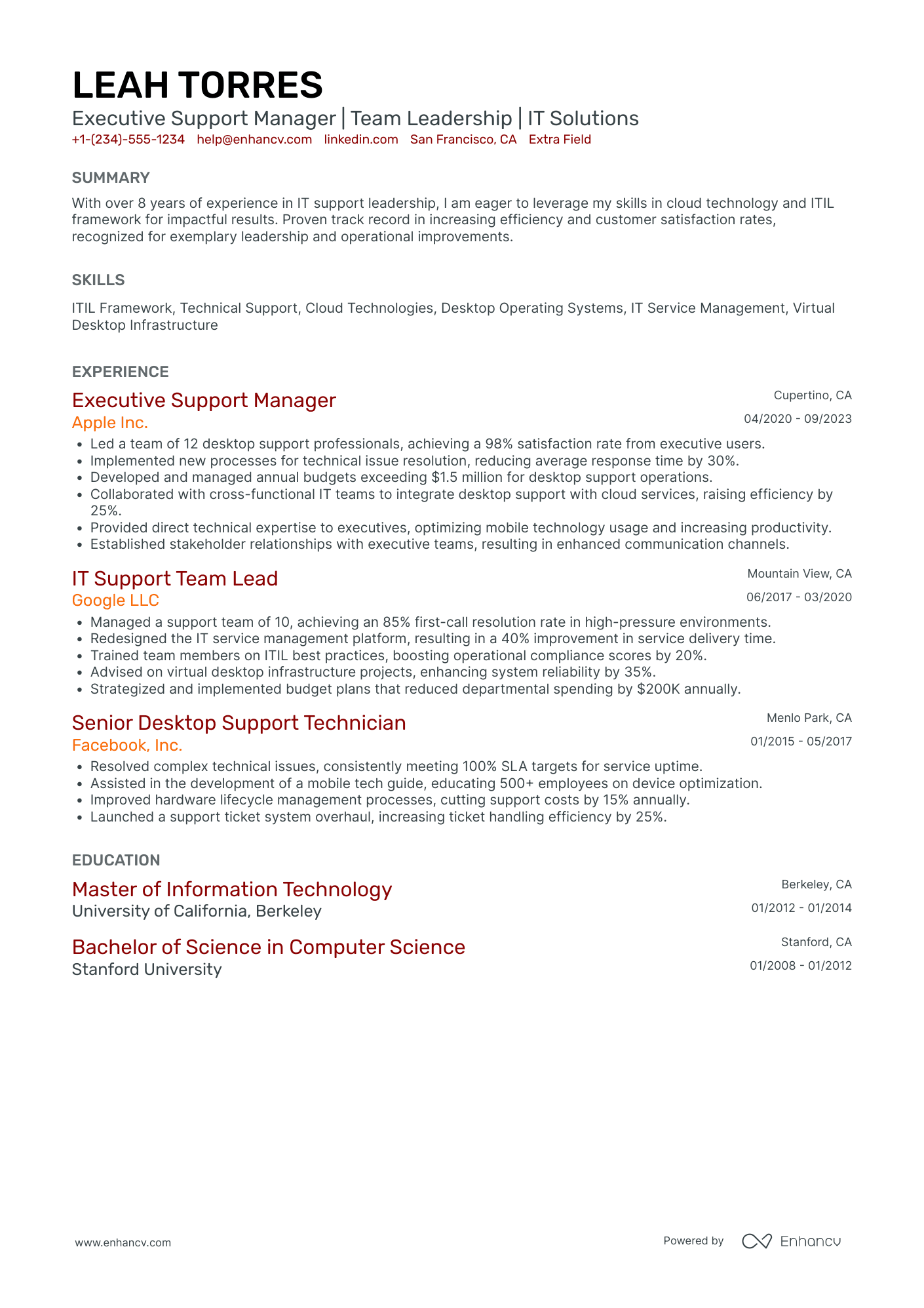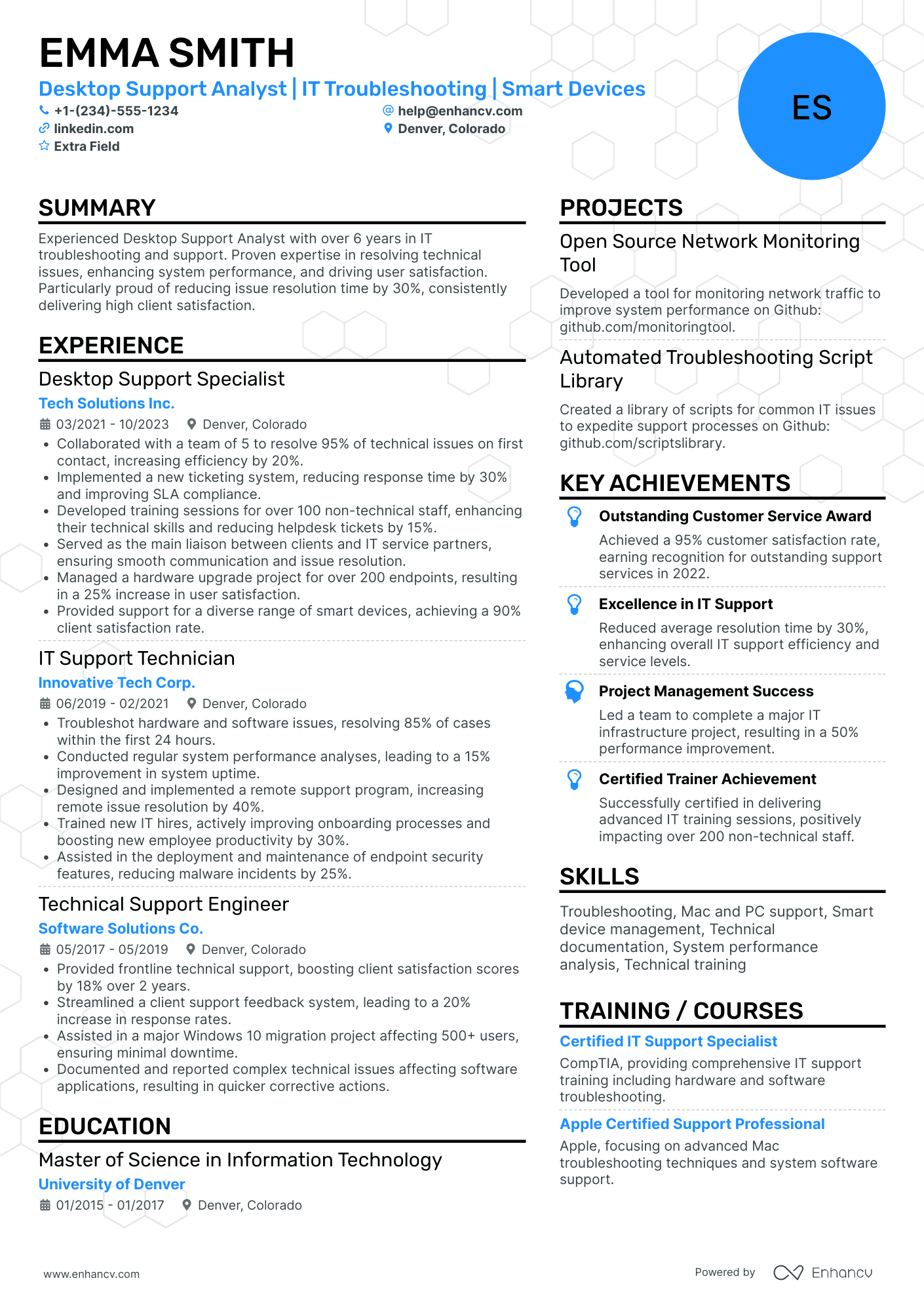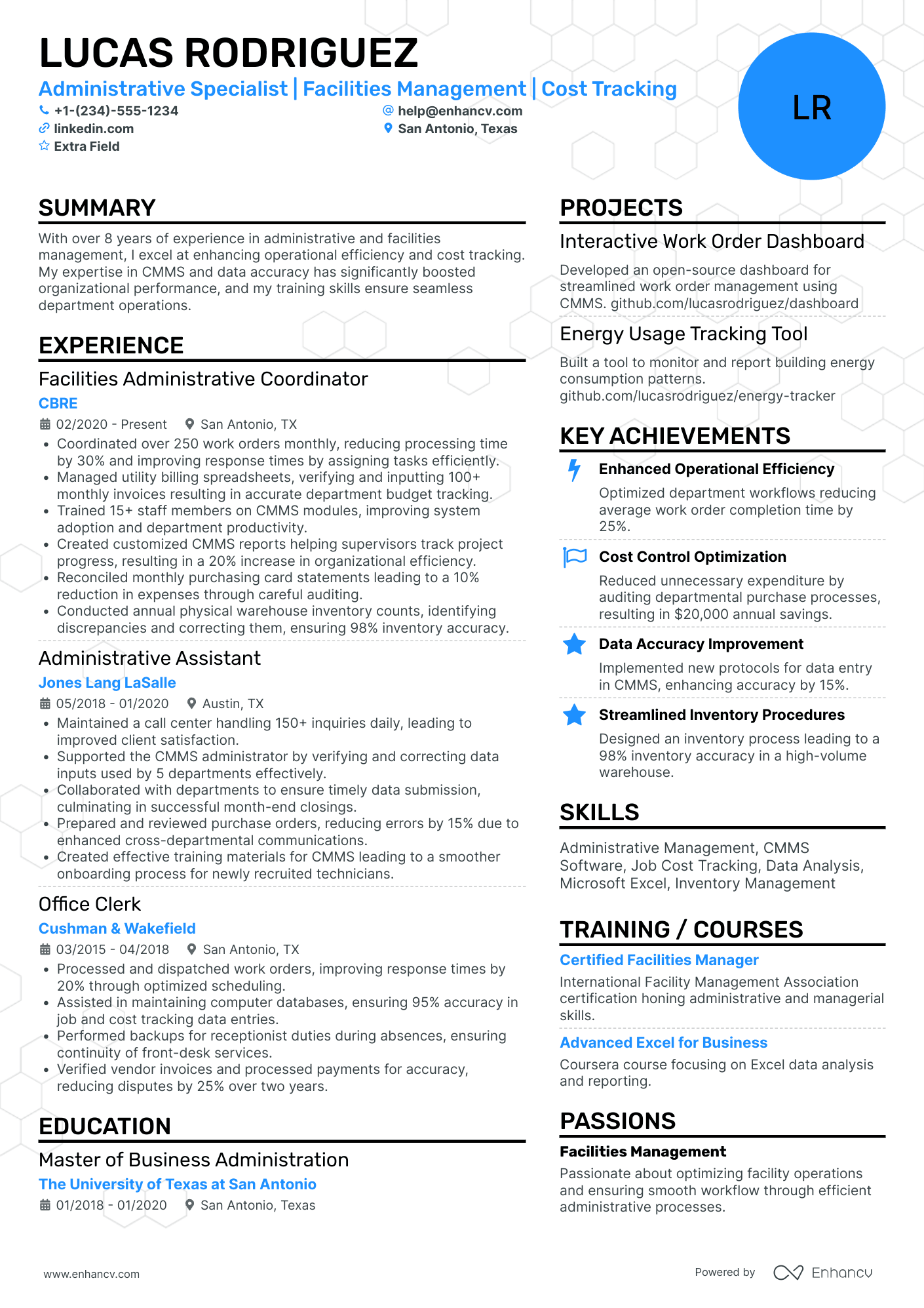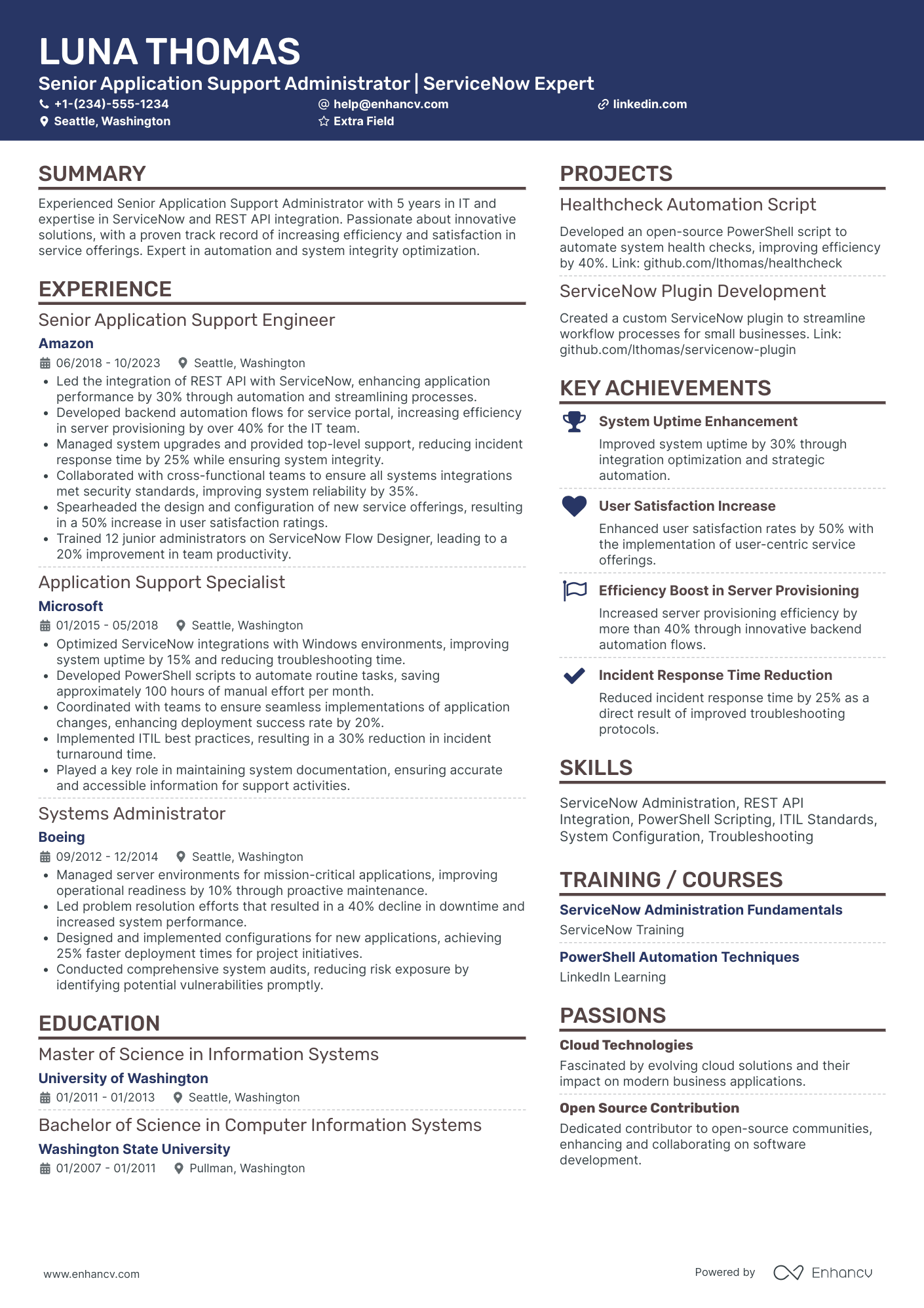Most desktop support resumes fail because they list tools and tickets without showing impact, so recruiters can't see value fast. A desktop support resume also needs clean keywords and structure to pass ATS screening in a crowded applicant pool. If you're unsure where to begin, learning how to write a resume from scratch can help you build a stronger foundation.
You'll stand out by proving outcomes: reduced resolution time, improved first-contact fixes, and fewer repeat incidents. Show scope and reliability, like devices supported, sites covered, rollout delivery, uptime gains, and higher customer satisfaction scores.
Key takeaways
- Quantify resolution speed, uptime, and ticket volume so recruiters see measurable impact immediately.
- Tailor every experience bullet to mirror the job posting's tools, systems, and frameworks.
- Use reverse-chronological format for seasoned candidates and hybrid format for career changers.
- Place certifications like CompTIA A+ and ITIL where they'll reinforce your strongest qualifications.
- Demonstrate skills in context through experience bullets, not just in a standalone list.
- Entry-level candidates should highlight homelabs, volunteer IT work, and hands-on projects with outcomes.
- Enhancv's Bullet Point Generator helps turn vague duties into specific, recruiter-ready resume bullets.
Job market snapshot for desktop supports
We analyzed 249 recent desktop support job ads across major US job boards. These numbers help you understand employer expectations, top companies hiring, industry demand at a glance.
What level of experience employers are looking for desktop supports
| Years of Experience | Percentage found in job ads |
|---|---|
| 1–2 years | 16.5% (41) |
| 3–4 years | 12.9% (32) |
| 5–6 years | 11.6% (29) |
| 7–8 years | 1.2% (3) |
| 10+ years | 0.4% (1) |
| Not specified | 57.0% (142) |
Desktop support ads by area of specialization (industry)
| Industry (Area) | Percentage found in job ads |
|---|---|
| Finance & Banking | 43.8% (109) |
| Healthcare | 18.5% (46) |
| Education | 17.7% (44) |
| Professional Services | 10.4% (26) |
Top companies hiring desktop supports
| Company | Percentage found in job ads |
|---|---|
| TATA Consulting Services | 10.4% (26) |
Role overview stats
These tables show the most common responsibilities and employment types for desktop support roles. Use them to align your resume with what employers expect and to understand how the role is structured across the market.
Day-to-day activities and top responsibilities for a desktop support
| Responsibility | Percentage found in job ads |
|---|---|
| Windows | 32.1% (80) |
| Active directory | 21.7% (54) |
| Servicenow | 19.3% (48) |
| Troubleshooting | 18.1% (45) |
| Microsoft office | 13.7% (34) |
| Desktop support | 12.9% (32) |
| Lan | 12.4% (31) |
| Windows 11 | 12.4% (31) |
| Software installation | 12.0% (30) |
| Macos | 11.6% (29) |
| Hardware troubleshooting | 10.8% (27) |
| Itil | 10.8% (27) |
Type of employment (remote vs on-site vs hybrid)
| Employment type | Percentage found in job ads |
|---|---|
| On-site | 88.0% (219) |
| Hybrid | 10.4% (26) |
How to format a desktop support resume
Recruiters hiring for desktop support roles prioritize hands-on technical skills, troubleshooting ability, and a track record of resolving end-user issues efficiently. A clean, well-structured resume format ensures these signals—along with relevant certifications and ticket volume metrics—are immediately visible to both hiring managers and applicant tracking systems.
I have significant experience in this role—which format should I use?
Use a reverse-chronological format to present your desktop support career with the strongest and most recent experience leading the way. Do:
- Lead each role entry with your scope of responsibility, including the number of users supported, environments managed, and escalation ownership.
- Highlight proficiency in role-specific tools and domains such as Active Directory, SCCM, ServiceNow, Windows/macOS imaging, and remote desktop platforms.
- Quantify outcomes tied to resolution times, ticket volumes, SLA compliance, or user satisfaction scores.
I'm junior or switching into this role—what format works best?
Use a hybrid format to lead with a focused technical skills section while still showing your work history or relevant experience in chronological order. Do:
- Place a dedicated skills section near the top of your resume listing hardware, software, operating systems, and ticketing tools you've worked with.
- Include lab projects, internships, help desk volunteering, or IT support roles from adjacent fields to demonstrate hands-on troubleshooting experience.
- Connect every listed skill or project to a specific action and a measurable or observable result.
Why not use a functional resume?
A functional format strips away the timeline and context that hiring managers rely on to verify your desktop support experience is current, consistent, and grounded in real work environments.
- Career changers with transferable IT skills: If you've handled technical troubleshooting, hardware setup, or end-user training in a non-IT role and hold relevant certifications such as CompTIA A+ or ITIL.
- Recent graduates or bootcamp completers: If your work history is limited but you've completed hands-on lab environments, capstone projects, or IT internships that demonstrate desktop support competencies.
- Professionals with resume gaps: If you have a gap of six months or more but maintained skills through freelance support work, home lab projects, or continued certification training.
With your format established, the next step is filling it with the right sections to give hiring managers exactly what they're looking for.
What sections should go on a desktop support resume
Recruiters expect a desktop support resume to show clear ownership of ticket resolution, endpoint support, and customer-facing troubleshooting. Knowing what to put on a resume helps you prioritize the sections that matter most for this role.
Use this structure for maximum clarity:
- Header
- Summary
- Experience
- Skills
- Projects
- Education
- Certifications
- Optional sections: Awards, Volunteering, Languages
Strong experience bullets should emphasize measurable impact, resolution outcomes, supported user and device scope, and service levels you consistently met or improved.
Is your resume good enough?
Drop your resume here or choose a file. PDF & DOCX only. Max 2MB file size.
Once you’ve organized the key resume components in a clear structure, the next step is to write your desktop support resume experience section so your work history aligns with that layout and shows impact.
How to write your desktop support resume experience
Your work experience section should spotlight the technical problems you resolved, the tools and systems you used to deliver support, and the measurable outcomes your work produced—faster resolution times, higher satisfaction scores, or reduced downtime. Hiring managers prioritize demonstrated impact over descriptive task lists, so every bullet should prove you moved a metric, not just performed a duty.
Each entry should include:
- Job title
- Company and location (or remote)
- Dates of employment (month and year)
Three to five concise bullet points showing what you owned, how you executed, and what outcomes you delivered:
- Ownership scope: the hardware fleets, operating systems, endpoint environments, ticketing queues, or user populations you were directly accountable for in your desktop support role.
- Execution approach: the diagnostic utilities, remote-access platforms, imaging tools, patch management systems, or troubleshooting frameworks you relied on to resolve incidents and maintain endpoints.
- Value improved: the changes you drove in ticket resolution time, system uptime, first-call fix rate, endpoint security posture, or end-user productivity through your desktop support work.
- Collaboration context: how you partnered with network administrators, security teams, procurement, vendors, or non-technical end users to escalate issues, roll out hardware refreshes, or standardize configurations.
- Impact delivered: the tangible results your support efforts produced, expressed through service-level improvements, reduced escalation volume, infrastructure cost savings, or scale of users and devices served.
Experience bullet formula
A desktop support experience example
✅ Right example - modern, quantified, specific.
Desktop Support Specialist
Northbridge Health Systems | Austin, TX
2022–Present
Supported a 24/7 healthcare network with 900+ endpoints across four clinics and a central office, with strict uptime and compliance requirements.
- Resolved 35–45 weekly incidents through ServiceNow, reducing average time to resolution from 6.2 hours to 3.8 hours by standardizing triage, prioritization, and escalation paths.
- Deployed and maintained 600+ Windows 11 devices using Microsoft Intune, Autopilot, and Microsoft Endpoint Configuration Manager, cutting new-hire provisioning time from two hours to 35 minutes.
- Hardened endpoints with Microsoft Defender for Endpoint and BitLocker enforcement via Group Policy, reducing high-severity security alerts by 28% and passing quarterly audit checks with zero critical findings.
- Automated repetitive fixes with PowerShell and remote remediation scripts, eliminating 120+ manual touchpoints per month and improving first-contact resolution by 14%.
- Partnered with network engineers and application owners to troubleshoot DHCP, DNS, VPN, and printer queue failures, restoring service for 200+ users during two priority-one outages within 60 minutes each.
Now that you've seen how a strong experience section comes together, let's look at how to adjust yours to match the specific job you're targeting.
How to tailor your desktop support resume experience
Recruiters evaluate your desktop support resume through both applicant tracking systems and manual review. Tailoring your resume to the job description ensures your qualifications connect directly with what the hiring team needs.
Ways to tailor your desktop support experience:
- Match the exact operating systems and hardware platforms listed in the posting.
- Mirror the ticketing system names the employer uses for incident tracking.
- Align your troubleshooting methods with the support frameworks they reference.
- Include remote desktop tools or endpoint management software they specify.
- Reflect their service level agreement benchmarks when describing resolution outcomes.
- Emphasize compliance or security protocols if the role involves regulated environments.
- Reference their escalation workflows or tiered support structure in your descriptions.
- Highlight Active Directory or group policy experience when domain management is required.
Tailoring means aligning your real accomplishments with each job's stated requirements, not forcing disconnected keywords into your experience section.
Resume tailoring examples for desktop support
| Job description excerpt | Untailored | Tailored |
|---|---|---|
| Provide Tier 1 and Tier 2 support for Windows 10/11 environments, troubleshooting hardware, software, and network connectivity issues using ServiceNow for ticket management. | Helped users with computer problems and resolved technical issues. | Delivered Tier 1 and Tier 2 desktop support across a 500-endpoint Windows 10/11 environment, resolving hardware, software, and network connectivity issues while maintaining a 95% first-call resolution rate through ServiceNow ticket management. |
| Image, configure, and deploy laptops and desktops using SCCM; manage Active Directory accounts, group policies, and permissions for onboarding and offboarding employees. | Set up new computers for employees and managed user accounts. | Imaged, configured, and deployed 30+ laptops and desktops monthly using SCCM, while managing Active Directory accounts, group policies, and permissions to streamline onboarding and offboarding for a 400-person organization. |
| Support VPN connectivity and Microsoft 365 applications for remote and hybrid workers; escalate unresolved issues to Tier 3 engineering teams with thorough documentation. | Assisted remote employees with technical issues and escalated tickets when needed. | Troubleshot VPN connectivity and Microsoft 365 issues for 200+ remote and hybrid workers, reducing average resolution time by 20% and providing detailed documentation for seamless Tier 3 escalations to the engineering team. |
Once you’ve aligned your experience with the role’s priorities, quantify your desktop support achievements to show the measurable impact of that work.
How to quantify your desktop support achievements
Quantifying your achievements shows the business impact behind tickets and troubleshooting. Focus on resolution speed, uptime, security risk reduction, customer satisfaction, and cost savings from standardization and automation.
Quantifying examples for desktop support
| Metric | Example |
|---|---|
| Resolution speed | "Cut average time to resolution from 2.4 hours to 1.3 hours by adding ServiceNow templates and remote triage in BeyondTrust." |
| Reliability | "Improved workstation uptime to 99.7% by standardizing Windows patching with Microsoft Intune across 420 endpoints." |
| Quality | "Reduced repeat tickets by 28% by publishing ten KB articles and adding post-resolution checks for printer and VPN issues." |
| Security risk | "Decreased phishing-related incidents by 35% by tuning Microsoft Defender policies and running monthly user spot-training for 180 staff." |
| Volume throughput | "Handled 45 tickets per day on average while maintaining SLA compliance at 96% during a two-month office relocation for 150 users." |
Turn vague job duties into measurable, recruiter-ready resume bullets in seconds with Enhancv's Bullet Point Generator.
Once you've crafted strong bullet points for your experience section, you'll want to apply the same precision to showcasing your hard and soft skills throughout your desktop support resume.
How to list your hard and soft skills on a desktop support resume
Your skills section shows you can resolve incidents fast and keep endpoints secure—recruiters and applicant tracking systems scan this section for keyword matches and role fit—so aim for a balanced mix of technical competencies and job-specific behaviors. Desktop support roles require a blend of:
- Product strategy and discovery skills.
- Data, analytics, and experimentation skills.
- Delivery, execution, and go-to-market discipline.
- Soft skills.
Your skills section should be:
- Scannable (bullet-style grouping).
- Relevant to the job post.
- Backed by proof in experience bullets.
- Updated with current tools.
Place your skills section:
- Above experience if you're junior or switching careers.
- Below experience if you're mid/senior with strong achievements.
Hard skills
Your hard skills demonstrate the specific technical competencies hiring managers expect:
- Windows 10/11, macOS support
- Microsoft 365 administration
- Active Directory, Group Policy
- Azure Active Directory (Entra ID)
- Intune, Autopilot device provisioning
- Jamf Pro macOS management
- ServiceNow, Jira Service Management
- Endpoint security: Defender, CrowdStrike
- TCP/IP, DNS, DHCP, VPN troubleshooting
- Remote support: RDP, TeamViewer
- PowerShell scripting
- Imaging: MDT, SCCM
Soft skills
Your soft skills show how you communicate, prioritize, and collaborate under pressure:
- Triage and prioritize incidents
- Translate technical issues for nontechnical users
- Ask targeted questions to isolate root cause
- Document fixes in tickets and knowledge base
- Set clear expectations and follow through
- Escalate with complete context and logs
- Coordinate with network, security, and HR teams
- Stay calm during outages and high volume
- Manage time across competing requests
- Own issues through resolution and verification
- Train users on tools and security practices
- Protect confidentiality and handle access carefully
How to show your desktop support skills in context
Skills shouldn't live only in a bulleted list on your resume. Browse examples of resume skills to see how other professionals present theirs effectively.
They should be demonstrated in:
- Your summary (high-level professional identity)
- Your experience (proof through outcomes)
Here's what that looks like in practice.
Summary example
Senior desktop support specialist with eight years in healthcare IT. Skilled in Active Directory, SCCM, and ITIL-based workflows. Reduced average ticket resolution time by 34% while supporting 1,200+ endpoints across three hospital campuses.
- Reflects senior-level experience clearly
- Names industry-relevant tools and frameworks
- Leads with a measurable performance outcome
- Signals communication and cross-site coordination
Experience example
Senior Desktop Support Technician
Allegheny Health Network | Pittsburgh, PA
March 2019–August 2024
- Resolved 95% of Tier 2 tickets within SLA by leveraging SCCM, PowerShell, and remote diagnostic tools across distributed teams.
- Partnered with network engineers to migrate 800 workstations to Windows 11, completing the rollout two weeks ahead of schedule.
- Mentored three junior technicians on Active Directory troubleshooting, cutting escalation rates by 22% within six months.
- Every bullet includes a measurable outcome.
- Skills appear naturally within real accomplishments.
Once you’ve anchored your technical strengths in real tasks and outcomes, the next step is to translate that approach into a desktop support resume when you don’t have formal experience.
How do I write a desktop support resume with no experience
Even without full-time experience, you can demonstrate readiness through:
- IT help desk volunteer shifts
- Homelab Windows and Linux builds
- Customer support or retail tech
- School IT lab assistant work
- Personal device repair and troubleshooting
- Ticketing system practice projects
- CompTIA A+ or Google IT Support
- Remote support for family devices
If you're in this situation, our guide on building a resume without work experience can help you structure your application around projects and transferable skills.
Focus on:
- Ticket documentation with clear resolution
- Windows, macOS, and basic networking
- Troubleshooting steps and root cause
- Measurable outcomes and service metrics
Resume format tip for entry-level desktop support
Use a hybrid resume format because it highlights technical skills and projects first, while still showing any work history. Do:
- Add a "Projects" section near top.
- List tools: ServiceNow, Jira, Intune.
- Include ticket volume and resolution rates.
- Show OS and hardware you supported.
- Quantify outcomes: time saved, fewer repeats.
- Built a Windows homelab, documented fifty troubleshooting tickets in Jira, and cut repeat issues by thirty percent through standardized fixes and driver updates.
Even without professional experience, your education section can demonstrate the technical foundation and relevant knowledge that employers look for in desktop support candidates.
How to list your education on a desktop support resume
Your education section helps hiring teams confirm you have the foundational technical knowledge needed for desktop support. It validates your training in hardware, networking, and troubleshooting fundamentals.
Include:
- Degree name
- Institution
- Location
- Graduation year
- Relevant coursework (for juniors or entry-level candidates)
- Honors & GPA (if 3.5 or higher)
Skip month and day details—list the graduation year only.
Here's a strong education entry tailored for a desktop support resume:
Example education entry
Bachelor of Science in Information Technology
George Mason University, Fairfax, VA
Graduated 2022
GPA: 3.7/4.0
- Relevant Coursework: Computer Hardware Fundamentals, Network Administration, Operating Systems, IT Service Management, and Cybersecurity Basics
- Honors: Dean's List (six consecutive semesters), Magna Cum Laude
How to list your certifications on a desktop support resume
Certifications on your resume show your commitment to learning, prove tool proficiency, and confirm industry relevance for desktop support roles. They also help hiring teams trust your ability to troubleshoot, secure, and support users quickly.
Include:
- Certificate name
- Issuing organization
- Year
- Optional: credential ID or URL
- Place certifications below education when your degree is recent and more relevant than your certifications.
- Place certifications above education when they are recent, job-critical, or your education is older or less related to desktop support.
Best certifications for your desktop support resume
CompTIA A+ CompTIA Network+ CompTIA Security+ Microsoft Certified: Modern Desktop Administrator Associate ITIL 4 Foundation Cisco Certified Support Technician (CCST): Networking HDI Desktop Support Technician
Once you’ve positioned your credentials where hiring managers will notice them, you can use your desktop support resume summary to tie them to the value you bring at a glance.
How to write your desktop support resume summary
Your resume summary is the first thing a recruiter reads. A strong one instantly signals you have the right skills and experience for a desktop support role.
Keep it to three to four lines, with:
- Your title and total years of hands-on desktop support experience.
- The industry or environment you've worked in, such as corporate, healthcare, or education.
- Core tools and technologies like Active Directory, SCCM, Windows 10/11, and ticketing systems.
- One or two measurable wins, such as reduced resolution times or improved user satisfaction scores.
- Soft skills tied to real outcomes, like clear communication that cut repeat tickets.
PRO TIP
At this level, emphasize technical proficiency, relevant certifications, and early results you've delivered. Highlight specific tools and environments rather than vague claims. Avoid phrases like "passionate team player" or "hardworking self-starter." Recruiters want proof of what you can do, not personality descriptors.
Example summary for a desktop support
Desktop support technician with three years of experience resolving 40+ tickets daily across Windows and macOS environments. Reduced average resolution time by 22% using Active Directory and ServiceNow workflows.
Optimize your resume summary and objective for ATS
Drop your resume here or choose a file.
PDF & DOCX only. Max 2MB file size.
Now that your summary captures your desktop support expertise at a glance, make sure your header presents the essential contact details recruiters need to actually reach you.
What to include in a desktop support resume header
Your resume header lists your key contact details and role focus, helping desktop support candidates earn visibility, build credibility, and pass recruiter screening faster.
Essential resume header elements
- Full name
- Tailored job title and headline
- Location
- Phone number
- Professional email
- GitHub link
- Portfolio link
A LinkedIn link helps recruiters verify titles, dates, and endorsements quickly, which supports faster screening.
Don't include a photo on a desktop support resume unless the role is explicitly front-facing or appearance-dependent.
Keep your header to two lines, match the job title to the posting, and use links that open to polished, active profiles.
Desktop support resume header
Jordan Lee
Desktop support specialist | Windows, macOS, and ticketing systems
Austin, TX | (512) 555-01XX | your.name@enhancv.com | github.com/yourname | yourwebsite.com | linkedin.com/in/yourname
Once your contact details and role identifiers are in place, you can strengthen the rest of your application by adding relevant additional sections for desktop support resumes.
Additional sections for desktop support resumes
When your core qualifications match other candidates, additional sections can set you apart and reinforce your desktop support expertise.
- Certifications (CompTIA A+, ITIL, Microsoft 365 Certified)
- Technical projects
- Languages
- Volunteer experience
- Professional affiliations
- Hobbies and interests
- Awards and recognition
Once you've strengthened your resume with relevant additional sections, the next step is pairing it with a cover letter that adds context and personality to your application.
Do desktop support resumes need a cover letter
Desktop support resumes don't always need a cover letter. Many hiring teams skip them, especially for high-volume roles. It helps when the role is competitive, the company expects one, or your resume needs context to stand out. If you're unfamiliar with this document, start by understanding what a cover letter is and when it adds value.
Use a cover letter when it can add clear value:
- Explain role and team fit: Match your experience to the environment, tools, shift needs, and support model.
- Highlight one or two outcomes: Share a specific project or result, like reducing ticket backlog or improving device deployment time.
- Show product and user understanding: Reference the users you support, key workflows, and how you prioritize issues that impact the business.
- Address transitions or gaps: Connect non-obvious experience to desktop support, and clarify changes in industry, role level, or employment history.
Drop your resume here or choose a file.
PDF & DOCX only. Max 2MB file size.
Once you’ve decided whether a cover letter adds value to your desktop support application, you can use AI to improve your desktop support resume by quickly refining the content you submit.
Using AI to improve your desktop support resume
AI can sharpen your resume's clarity, structure, and impact. It helps you find stronger phrasing and tighten loose bullets. But overuse kills authenticity. Once your content feels clear and aligned with the role, step away from AI. If you're curious about where to start, explore ChatGPT resume writing prompts designed to improve specific sections.
Here are 10 prompts you can copy and paste to strengthen specific sections of your desktop support resume:
- Strengthen your summary: "Rewrite my desktop support resume summary to highlight my core technical skills, ticket volume, and user satisfaction in three sentences or fewer."
- Quantify experience bullets: "Add measurable results to these desktop support experience bullets, focusing on resolution time, ticket count, and first-call fix rate."
- Tighten skills formatting: "Organize my desktop support skills section into clear categories like operating systems, hardware, remote tools, and ticketing platforms."
- Improve action verbs: "Replace weak verbs in my desktop support experience section with strong, specific action verbs that show hands-on troubleshooting."
- Tailor to a job posting: "Compare my desktop support resume bullets against this job description and flag missing keywords or misaligned responsibilities."
- Refine project descriptions: "Rewrite this desktop support project entry to clearly state the problem, my role, tools used, and the outcome."
- Clarify certification entries: "Format my desktop support certifications section to include credential name, issuing body, date earned, and relevance to the role."
- Cut filler language: "Remove vague phrases and unnecessary words from my desktop support resume without changing the meaning of each bullet."
- Align education details: "Rewrite my education section to emphasize coursework and labs directly relevant to a desktop support position."
- Fix inconsistent formatting: "Standardize tense, punctuation, and structure across all desktop support experience bullets so they read consistently."
Stop using AI once your resume sounds accurate, specific, and true to your real experience. AI should never invent experience or inflate claims—if it didn't happen, it doesn't belong here.
Conclusion
A strong desktop support resume proves impact with measurable outcomes, highlights role-specific skills, and uses a clear structure that’s easy to scan. It shows faster ticket resolution, higher customer satisfaction, reduced downtime, and fewer repeat incidents.
Keep your desktop support experience focused, consistent, and results-driven, so hiring teams can assess fit quickly. This approach signals readiness for today’s hiring market and supports fast-moving desktop support needs.
